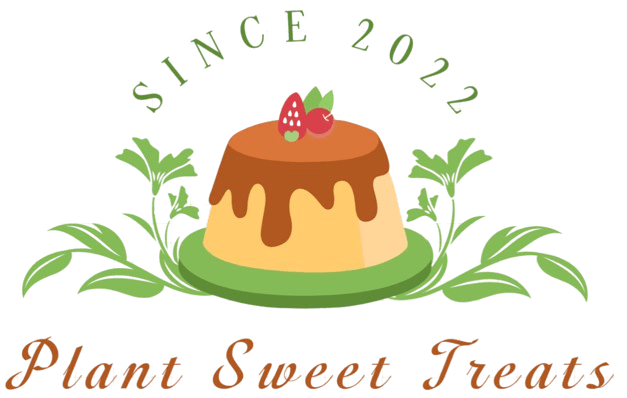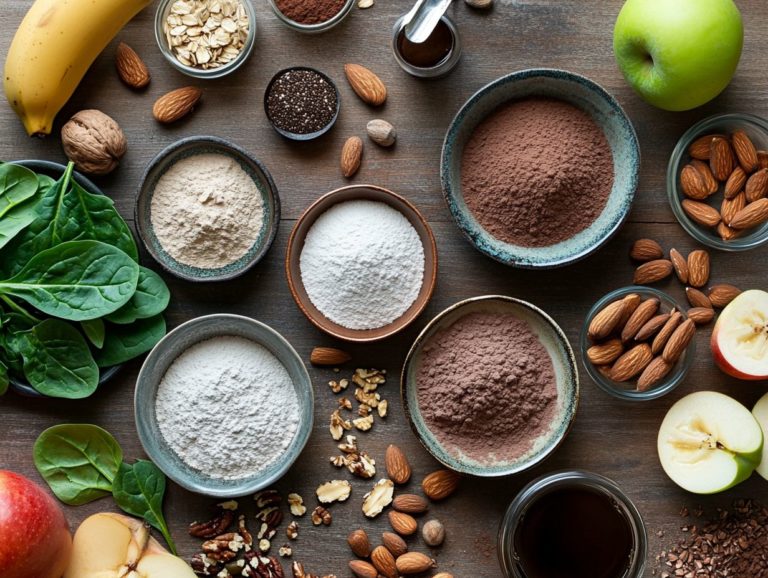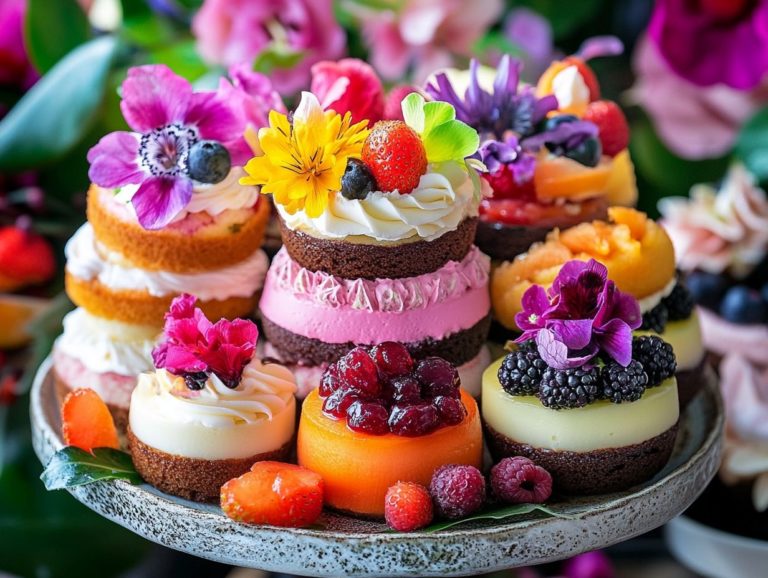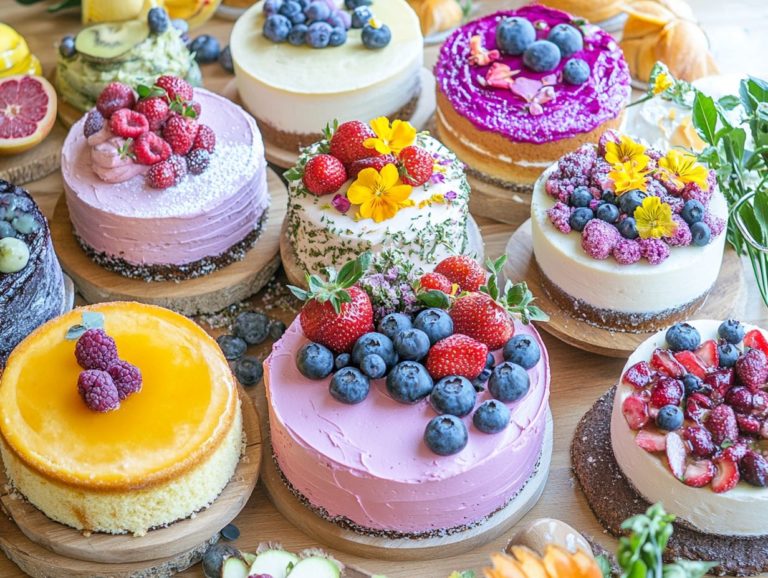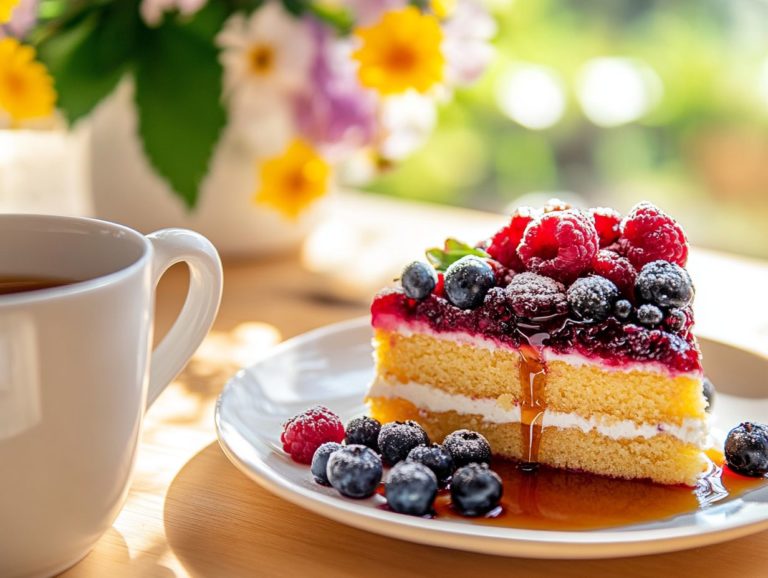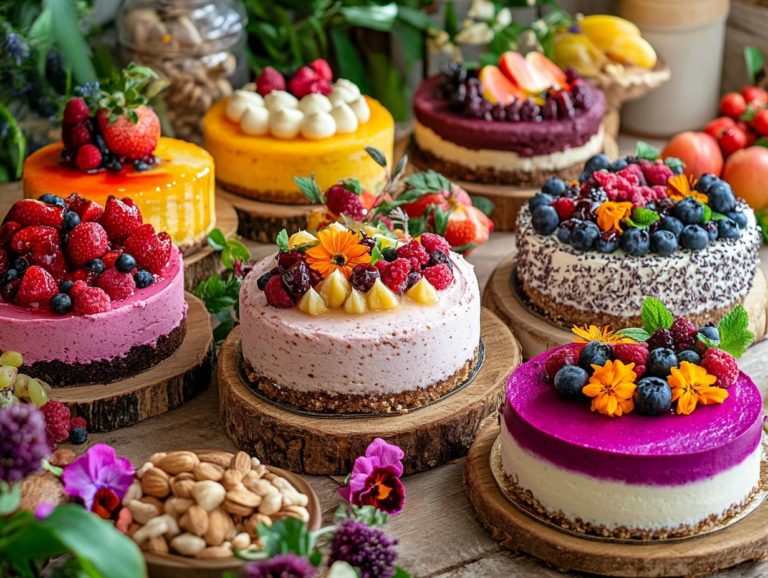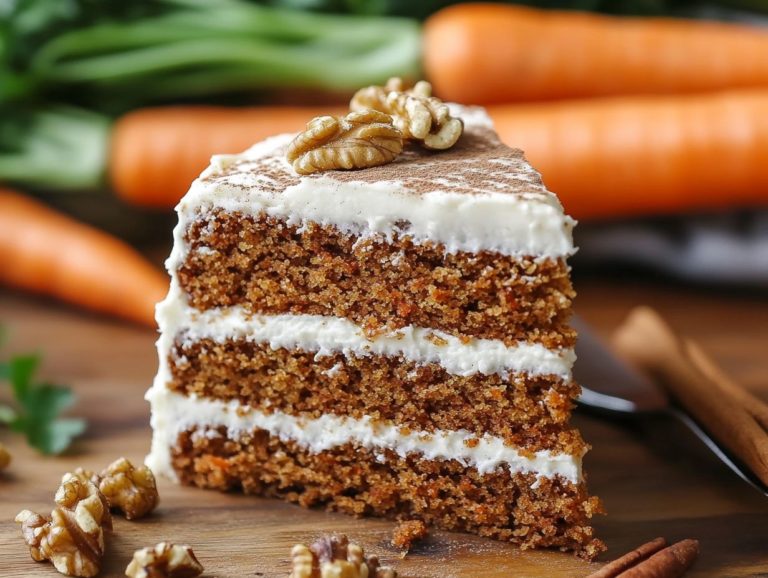Ultimate Guide to Vegan Cakes: Ingredients & Tips
Are you intrigued by the surging popularity of vegan cakes and other delectable vegan desserts?
Vegan cakes are not merely a delightful alternative; they also represent a healthier choice for both you and the planet. With their impressive health benefits and positive environmental and ethical impacts, vegan cakes provide a guilt-free indulgence you can truly enjoy. Plus, explore a variety of cake recipes and baking tips to perfect your vegan baking skills.
You’ll discover essential ingredients that make these cakes shine, such as vegan cream cheese and other dairy alternatives. You will also gain valuable tips to perfect your baking skills and learn about common pitfalls to avoid, ensuring your baking journey is as smooth as possible.
Prepare to elevate your baking repertoire with exquisite vegan creations, including vegan muffins and vegan cheesecake! Get ready to impress your taste buds with these scrumptious creations!
Contents
- Environmental Benefits of Vegan Cakes
- Vegan Baking: Substitutes and Tips
- Are there any vegan substitutes for eggs in cake recipes and cookie recipes?
- Do I need to use a specific type of flour for vegan cakes and vegan muffins?
- What are some tips for making fluffy and moist vegan cakes and vegan cheesecake?
- Can I use any type of non-dairy milk in vegan cake recipes and other baking recipes?
- Are there any tips for decorating vegan cakes and other vegan desserts?
Key Takeaways:
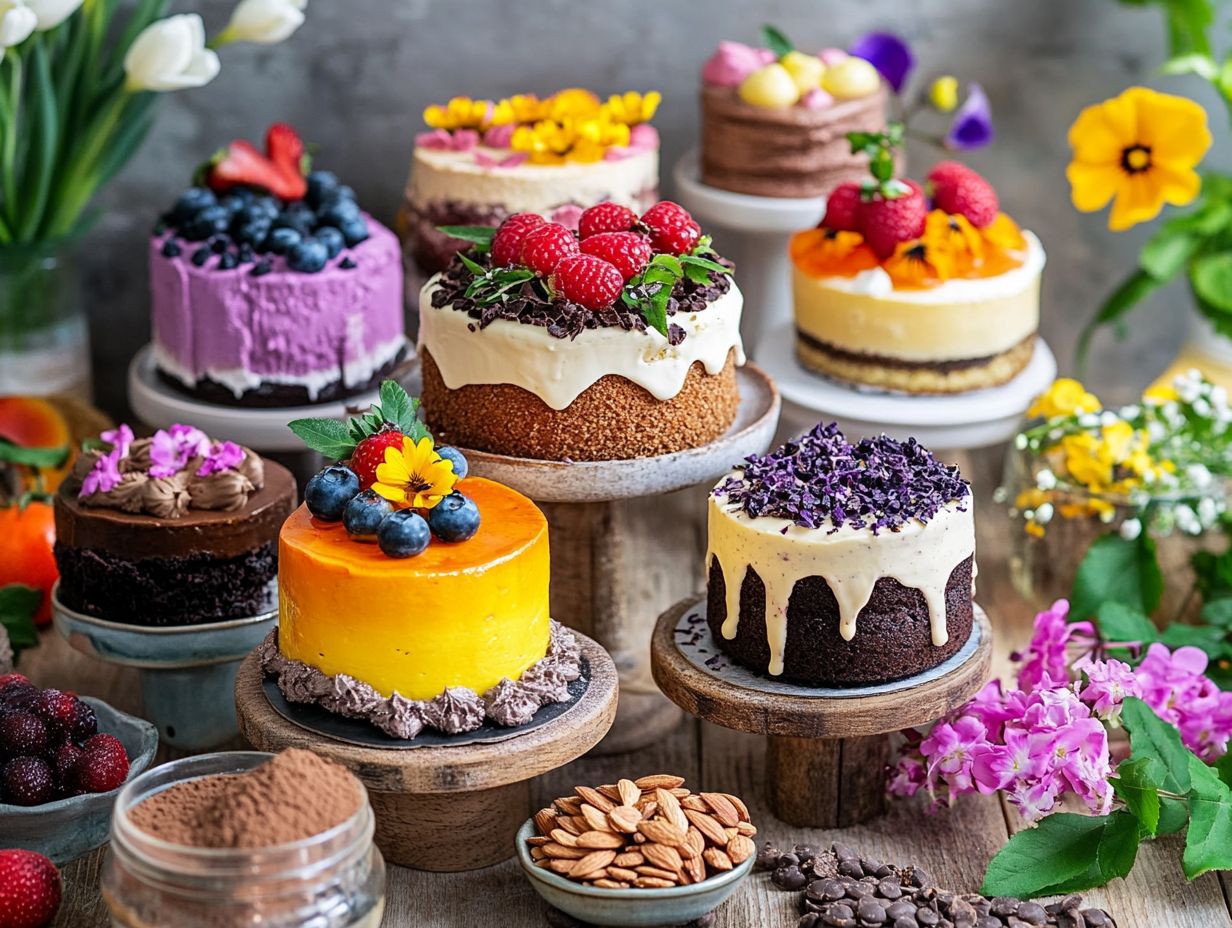
- Vegan cakes offer health, environmental, and ethical benefits over traditional cakes.
- Key ingredients for vegan cakes include alternative flours, sweeteners, binders like flax egg and aquafaba (a chickpea liquid that can replace eggs), fats, and flavorings.
- To bake the perfect vegan cake, use substitutions, prevent dryness, enhance flavor, and decorate creatively.
Why Choose Vegan Cakes?
Choosing vegan cakes is a delightful and health-conscious decision that invites you into the vibrant world of vegan baking. Crafted entirely from plant-based ingredients, these cakes skip traditional dairy products and eggs, resulting in a host of health benefits, a positive environmental impact, and ethical considerations that resonate with today s mindful consumer.
By incorporating alternatives like vegan butter, plant-based milk options such as almond milk, coconut milk, or soy milk, and innovative egg substitutes like aquafaba, flax eggs, or mashed banana, vegan cakes indulge your sweet cravings while harmonizing beautifully with a compassionate lifestyle.
Health Benefits of Vegan Cakes
Vegan cakes present a wealth of health benefits, primarily due to their plant-based ingredients that contribute to a more balanced diet. Options like almond milk, coconut milk, and nutritional yeast elevate flavor while infusing essential nutrients often lacking in traditional cakes loaded with dairy and eggs.
These cakes typically have lower levels of unhealthy fats, contributing to reduced cholesterol levels and making them a heart-healthy option for you. Rich in dietary fiber, they promote better digestion and foster feelings of fullness, helping you resist the urge to overindulge. Ingredients like ground flaxseed and nutritional yeast also add a nutritional punch to your baking recipes.
With ingredients such as flaxseeds, chia seeds, and oats, you enhance the fiber content and gain an important source of omega-3 fatty acids, crucial for maintaining cardiovascular health. Fruits commonly featured in vegan cakes, like bananas, apples, or apple cider vinegar, are brimming with vitamins and antioxidants, further enriching their nutritional profile and supporting your overall well-being.
Ready to try your hand at vegan baking? Start with a delicious vegan cake recipe today!
Environmental Benefits of Vegan Cakes
The environmental benefits of choosing vegan cakes are truly significant. By eliminating animal products, you can dramatically reduce your carbon footprint, as these products are often linked to high resource consumption and greenhouse gas emissions. When you opt for ingredients like plant-based milk options such as almond milk, soy milk, or oat milk, and vegan butter from brands like Earth Balance or Kirkland, you’re not just baking delicious desserts; you’re also supporting sustainable practices.
This shift toward plant-based baking does more than ease the strain on the planet’s resources; it actively promotes a healthier ecosystem. By incorporating flour alternatives like almond or coconut flour, you can enhance sustainability even further, as these options require less water and energy to produce compared to traditional wheat.
Many vegan recipes feature whole fruits and vegetables, allowing you to add natural sweetness and nutrients without the environmental impact of animal farming. Ingredients such as Nature s Charm coconut cream and sweetened condensed milk make for delicious dairy-free recipes. Embracing these ingredients means indulging guilt-free in deliciousness while participating in a growing movement that champions environmental awareness and conscious living.
Ethical Benefits of Vegan Cakes
Choosing vegan cakes resonates with your ethical principles, emphasizing compassion for animals and the environment. It s a thoughtful decision that many bakers and dessert enthusiasts embrace. By steering clear of eggs and dairy, which often come at the cost of animal suffering, vegan baking fosters a kinder, more humane approach to food preparation and enjoyment. Using substitutes like dairy-free yogurt and whipped tofu from brands like Tofutti and Daiya can enrich your baking recipes.
These practices not only diminish the demand for animal agriculture a major player in environmental degradation and climate change but they also resonate with advocates of cruelty-free living. Transitioning to a plant-based lifestyle opens up a world of alternative ingredients like flaxseeds, aquafaba (the liquid from canned chickpeas, a fantastic egg white substitute), and nut milks, each one not just delicious but also a testament to the creativity that ethical baking can inspire.
This shift enables you to engage in a burgeoning movement that champions animal rights and sustainable food systems, cultivating a sense of community among those who hold similar values.
Key Ingredients for Vegan Cakes
The key ingredients for vegan cakes are essential for creating desserts that are not only delectable but also capture the texture and flavor of traditional cakes without relying on any animal products. By understanding the right combinations of flour alternatives like almond flour, sweeteners such as coconut sugar or maple syrup, binders like aquafaba, flax egg, or apple cider vinegar, and plant-based fats like coconut oil or vegan butter, you can achieve perfectly moist and flavorful vegan cakes.
Embrace these elements, and you ll elevate your baking game to a whole new level of indulgence.
Flour Alternatives
When you re baking vegan cakes, choosing the right flour alternatives is crucial, especially if you re on the hunt for gluten-free options or eager to explore a spectrum of flavors and textures. Options like almond flour, coconut flour, and oat flour not only bring their own unique tastes to the table but also cater to various dietary preferences, making them superb additions to your vegan baking repertoire.
These alternatives can dramatically influence the scent, taste, and texture of your final creation, often resulting in cakes that are moist, rich, and surprisingly decadent. For example, almond flour introduces a subtle nuttiness that adds a delightful bite, while coconut flour tends to be a moisture sponge, often requiring a bit more liquid to reach that perfect consistency. On the other hand, oat flour offers a light and fluffy crumb, ideal for cakes like a classic vanilla sponge. Try incorporating these flours in various baking recipes to explore their unique characteristics.
As a vegan enthusiast, you can have fun experimenting with these flours in recipes such as almond flour chocolate cupcakes or fluffy coconut flour banana bread, illustrating just how versatile and rewarding flour alternatives can be in enhancing both flavor and nutritional value.
So, roll up your sleeves and start baking your next vegan cake adventure!
Sweeteners
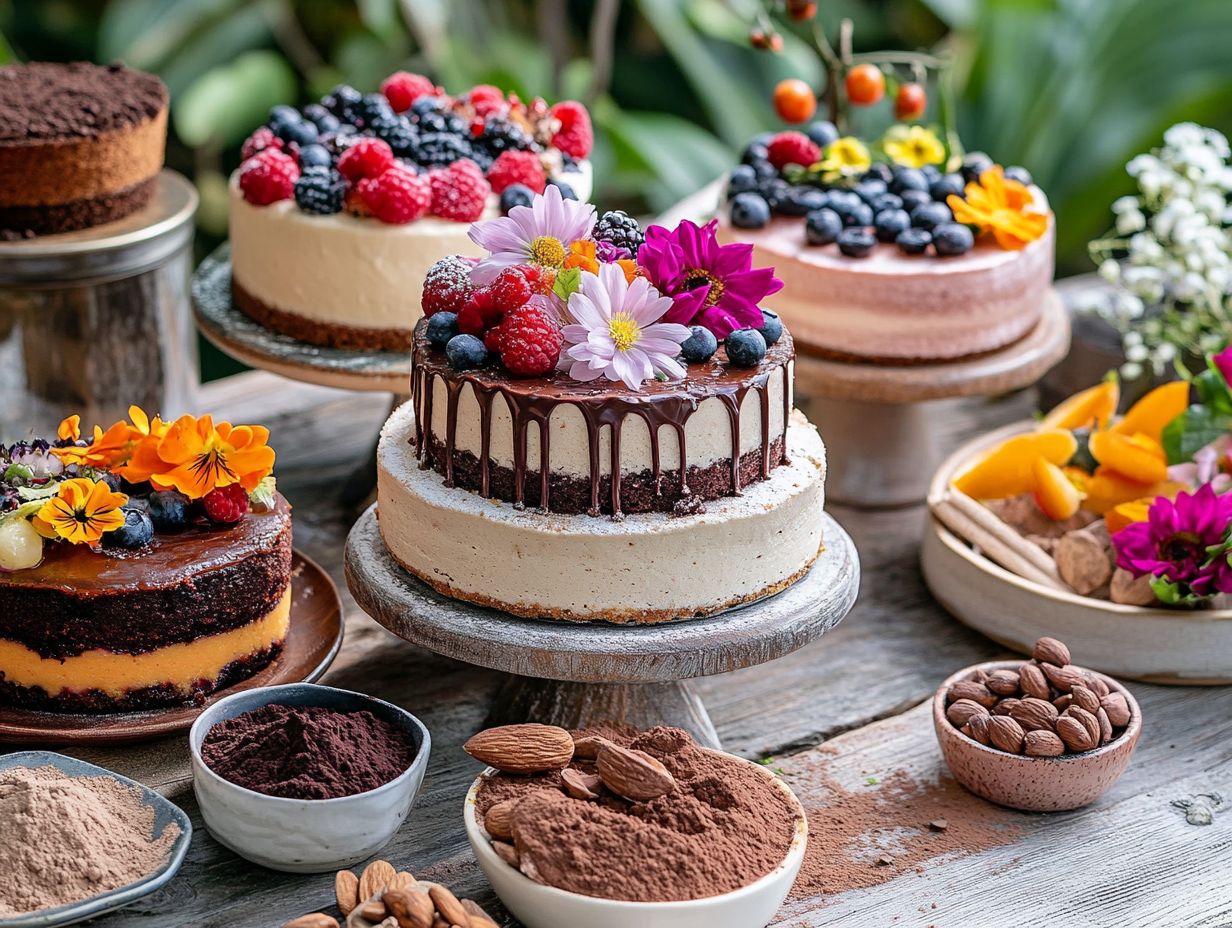
Selecting the right sweeteners is crucial for crafting vegan cakes. They help achieve the perfect balance between flavor and moisture without sacrificing health.
Embrace natural sweeteners like coconut sugar, maple syrup, and agave nectar. They not only elevate sweetness but also enhance the overall texture and flavor profile of your cake.
Coconut sugar, with its rich caramel notes, brings a delightful depth to chocolate-based cakes that s simply irresistible. On the other hand, maple syrup offers a warm, earthy sweetness that pairs beautifully with spiced cakes, enhancing those cozy flavors of cinnamon and nutmeg.
If you prefer something lighter, agave nectar is a fantastic choice, delivering a mild sweetness that seamlessly blends into batters without overshadowing other ingredients.
As you bake, feel free to adjust sweetness levels by experimenting with ratios. For instance, when using a liquid sweetener like maple syrup, consider reducing the liquid components slightly to ensure that your cake maintains the right consistency.
Thoughtfully incorporating these natural sweeteners will not only make your creation taste incredible but also keep it wholesome and nutritious.
Binders and Leaveners
Binders and leaveners play a pivotal role in your vegan cakes, ensuring they rise beautifully and boast a delightful texture. Ingredients like aquafaba, the liquid from cooked chickpeas, or flax eggs made by mixing ground flaxseed with water are superb substitutes for eggs.
Baking powder and baking soda provide the crucial lift during the baking process. Understanding how to use these ingredients effectively can elevate your simple recipe into a show-stopping vegan masterpiece.
For example, when you incorporate aquafaba, be sure to whip it until it reaches stiff peaks; this mimics the texture of egg whites, resulting in a light and airy cake. Likewise, when working with baking soda, pairing it with an acidic ingredient like lemon juice or vinegar is essential to unleash its leavening powers.
Popular vegan cake recipes, such as decadent chocolate cakes and airy sponge cakes, truly shine when you master these techniques. They underscore the vital role that binders and leaveners play in achieving an impressive final product.
Don’t forget to explore other delightful baking recipes like cookies and muffins for more vegan treats.
Fats and Oils
In vegan baking, fats and oils are crucial for achieving the right texture and moisture. Options like coconut oil, vegetable oils, and vegan butter help replicate the richness of traditional cakes.
Vegan buttermilk, made by combining plant-based milk with an acid like lemon juice or apple cider vinegar, can also add a tangy flavor and soft texture to your baked goods.
Fats and oils elevate flavor, provide moisture, and enhance the overall texture of your creations. When you opt for ingredients like vegan butter, coconut oil, or various vegetable oils, you amplify the taste and achieve a delightful mouthfeel that can stand up to traditional cakes.
Incorporating these fats transforms any dryness typically associated with plant-based desserts into a rich, luxurious experience. For example, vegan butter lends a creamy texture that s perfect for indulgent cakes like chocolate or vanilla.
Coconut oil adds a hint of tropical essence, beautifully complementing fruity options like pineapple or carrot cake. Using neutral oils, such as canola or grapeseed, allows you to add moisture without overpowering the natural flavors, making them ideal for lighter cake recipes.
This thoughtful balance of fat types not only helps you achieve the desired crumb but also ensures that each bite is satisfying, showcasing the incredible versatility and deliciousness of vegan baking.
Baking Vegan Cakes: A Journey of Flavor and Texture
Baking vegan cakes is an exciting adventure that combines creativity and skill. Understanding the right techniques and selecting the best ingredients are essential for achieving delightful results. This guide will help you explore flavorings, substitutions, and tips to perfect your baking.
Flavorings and Add-ins
Flavorings and add-ins elevate vegan cakes, providing endless opportunities for creativity. Whether you choose vanilla or almond extracts, fruit purees for added moisture, or indulgent additions like vegan chocolate chips or nuts, these elements significantly enhance both the taste and visual allure of your cakes.
Experiment with spices such as cinnamon or nutmeg to introduce a warm and comforting note. A touch of citrus zest, like lemon or orange, brightens the flavor profile with a refreshing twist. Consider incorporating ingredients like coconut cream or silken tofu to provide a unique texture and richness.
For an unexpected delight, swirl in homemade fruit compotes or nut butters. They add complexity to each bite and create beautiful marbling throughout the cake. By thoughtfully selecting these flavorful components, you can craft vegan cakes that are a treat for the taste buds and a feast for the eyes, perfect for any occasion!
Tips for Baking the Perfect Vegan Cake
Baking the perfect vegan cake is an art that blends techniques, carefully selected ingredients, and awareness of potential pitfalls. Here are key principles to follow:
- Select proper substitutions for dairy and eggs
- Prevent dryness
- Thoughtfully enhance flavors
- Master decoration techniques
With these insights, you ll impress everyone with your delightful creation.
Substitutions for Dairy and Eggs
Understanding the details of substitutions for dairy and eggs is essential for achieving the perfect texture and flavor in vegan cakes. Options like flax eggs, Aquafaba the liquid from cooked chickpeas and various dairy alternatives such as luscious coconut cream or creamy vegan cream cheese can replace traditional ingredients without sacrificing quality.
Many bakers find that nut milks add subtle sweetness while keeping the batter moist. Applesauce is another excellent egg substitute, promoting a tender crumb without altering the cake s flavor. For a richness reminiscent of traditional recipes, blending silken tofu into a smooth paste offers that dense texture. Rice milk or oat milk is also favored for a light, creamy consistency.
Each substitute has unique characteristics, inviting you to experiment and discover which combination best enhances your cake. Embrace the adventure and let your creativity shine!
How to Prevent Dryness in Vegan Cakes
Preventing dryness in vegan cakes is crucial for achieving a moist and delightful dessert. This can be accomplished by selecting your ingredients thoughtfully and refining your baking techniques. Incorporate elements like plant-based milk, applesauce, or mashed bananas to boost moisture content while being mindful of baking times and temperatures.
Use ingredients like coconut oil or non-dairy yogurt to enrich the cake’s texture. Measure dry ingredients precisely to avoid excess air, which can lead to dryness. Adding a splash of vinegar or a squeeze of lemon juice facilitates chemical reactions that enhance moisture. Cover the cake as it cools to trap steam, preserving that luscious feel.
Adjust the oven temperature slightly downward for a gentler baking environment. This allows your cake to rise beautifully without drying out, ensuring each slice is a moist and satisfying experience.
How to Enhance Flavor in Vegan Cakes
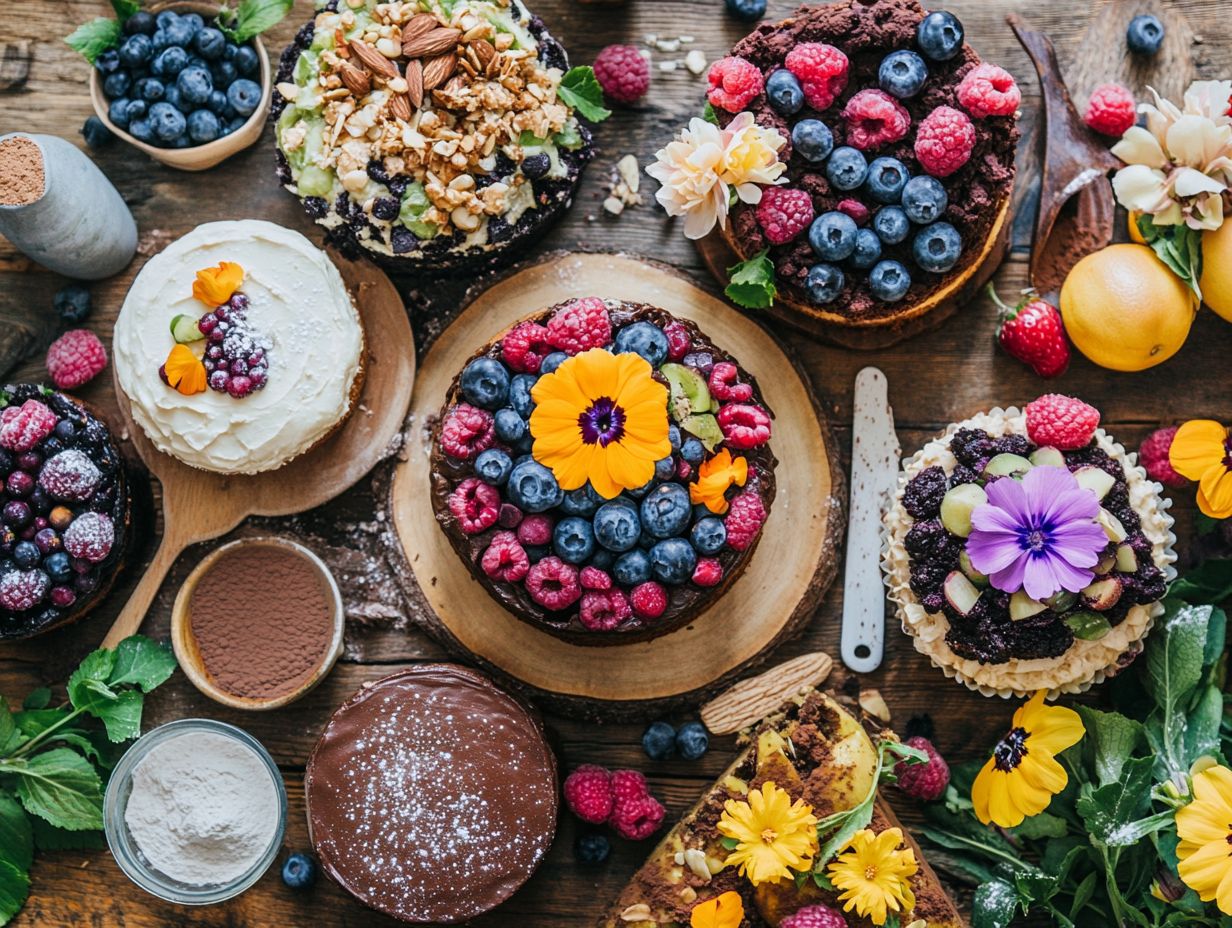
Enhancing the flavor of your vegan cakes is essential for crafting memorable desserts that truly delight your taste buds. You can achieve this through the clever use of flavorings and add-ins. By adding spices like cinnamon or nutmeg, extracts such as vanilla, and mix-ins like vegan chocolate or nuts, you ll elevate your cakes to new culinary heights.
Don t hesitate to experiment with the zest of citrus fruits like lemon or orange; they provide a refreshing twist that brightens the overall taste. You can also add pureed fruits like bananas or applesauce, which not only adds moisture but also brings in natural sweetness, making it easier to avoid refined sugars.
For a more adventurous flair, consider adding unexpected ingredients like a splash of coffee or a hint of almond extract. These can create a deeper, richer flavor profile that surprises and delights. By thoughtfully combining these elements, you can craft vegan cakes that are not only visually stunning but also bursting with layers of deliciousness.
Decorating Vegan Cakes
Decorating vegan cakes allows you to infuse a personal touch that elevates their visual allure, making them irresistibly inviting for your guests. By utilizing vegan frostings think creamy vegan cream cheese or luscious coconut cream along with innovative presentation techniques, you can transform an ordinary cake into a breathtaking centerpiece.
Incorporating fresh fruits, vibrant edible flowers, and colorful sprinkles will elevate the overall appearance, sparking curiosity and excitement among diners. If you’re aiming to leave a lasting impression, why not layer different flavors of vegan cake with contrasting frostings? The delightful visual effect when sliced will surely captivate everyone.
Feel free to get creative with techniques like drizzling rich chocolate ganache or employing a spatula to create artistic swirls; these can add a distinctive flair to your creation. And remember, the way you serve it matters just as much; presenting your adorned cake on a decorative platter or stand will further enhance its appeal, ensuring that your vegan cake isn t just a tasty treat but a stunning centerpiece at any gathering.
Common Mistakes to Avoid When Baking Vegan Cakes
Baking vegan cakes offers a truly rewarding experience, yet it’s crucial for you to steer clear of common pitfalls to ensure the best results.
Overmixing the batter, selecting the wrong type of flour, neglecting to let the cake cool before frosting, and mismeasuring ingredients can all undermine the texture and flavor of your delightful vegan creations.
By being mindful of these details, you can elevate your baking to new heights. Avoid these pitfalls to ensure your vegan cakes turn out perfect every time!
Overmixing the Batter
One of the most common mistakes you can make when baking vegan cakes is overmixing the batter, which can lead to a dense texture and unwanted gluten development. Gentle mixing is essential for combining the ingredients without sacrificing the cake’s lightness.
Follow best practices to balance mixing well and keeping the cake light. It s best to mix just until the dry ingredients are moistened and any lumps are minimal, using a spatula or a wooden spoon for this task.
Incorporating ingredients in stages like adding wet to dry (this means adding your liquid ingredients to the dry mix) can significantly enhance your results. Keep in mind that your goal is to create a batter that is harmonious and uniform while still allowing some air pockets to form. This contributes to the fluffy texture you desire and elevates the overall flavor profile of your finished cake.
Using the Wrong Type of Flour
Are you ready to transform your baking with the right flour choices? Using the wrong type of flour when you’re baking vegan cakes can dramatically impact the final product’s texture and flavor, often resulting in less-than-stellar outcomes. It s crucial to grasp the unique qualities of flour alternatives like almond flour, coconut flour, and oat flour to select the perfect ingredient for your recipe.
Each type of flour brings its own distinct characteristics that can either elevate or undermine your creation. For example, almond flour infuses moisture and a delicate nuttiness, making it a fantastic choice for rich, dense cakes. Coconut flour absorbs a lot of liquid, which can lead to a drier texture unless you balance it with additional wet ingredients like oat milk or almond milk.
Oat flour delivers a mild flavor and pairs beautifully with other flours to achieve a light, airy structure. Therefore, as you explore the world of vegan cake recipes, it’s essential to consider the properties of these alternative flours to ensure your baking experience is both delightful and successful. You might also want to try different egg substitutes like flax egg or aquafaba to achieve the desired texture.
Not Letting the Vegan Cake Cool Before Frosting
Don’t let your cake fall flat allowing it to cool is key! Not allowing a vegan cake to cool before frosting is a mistake you ll want to avoid. It can lead to melting frosting and an unappealing presentation. Patience is your secret ingredient; letting the cake cool completely ensures the perfect texture and allows the frosting, such as vegan buttercream or coconut cream, to adhere beautifully.
This cooling period is crucial not just for aesthetics, but also for the overall taste experience. When the cake is too warm, the heat can cause both the frosting and any filling to slide off, resulting in a less-than-desirable outcome. Using dairy-free ingredients like Tofutti or Earth Balance can help maintain the desired texture.
To achieve optimal cooling, consider placing the cake on a wire rack. This promotes even airflow around the dessert and speeds up the process. If you re in a hurry, a brief stint in the fridge can help solidify the cake s surface. Just steer clear of freezing; it may introduce unwanted moisture and leave you with a soggy texture upon thawing. For added flavor, try incorporating some vegan chocolate or ground flaxseed into your recipes.
Not Using Proper Measurements
Precision is key in baking! Not using proper measurements when you re whipping up vegan cakes can lead to some serious inconsistencies in your results, affecting both taste and texture. Even the slightest discrepancy can turn your cake into something too dry or overly moist, especially when using plant-based milk or vegan butter as substitutes.
To ensure you achieve the best results, it s essential to wield the right measuring tools. Use dry measuring cups for flour and liquid measuring cups for ingredients like plant-based milk. For even greater accuracy, make friends with a kitchen scale, especially when dealing with weight-sensitive ingredients like alternative flour blends or sweeteners such as nutritional yeast or sweetened condensed milk.
By adhering to these practices, you ll not only enhance the flavor and consistency of your vegan cakes but also guarantee that the final product is truly worthy of celebration. Remember, taking the time to measure correctly is a smart investment in crafting that perfect, mouthwatering cake you ll be proud to serve. Incorporate high-quality vegan resources and plant-based ingredients to elevate your baking.
This video will guide you through essential techniques for baking vegan cakes.
Frequently Asked Questions
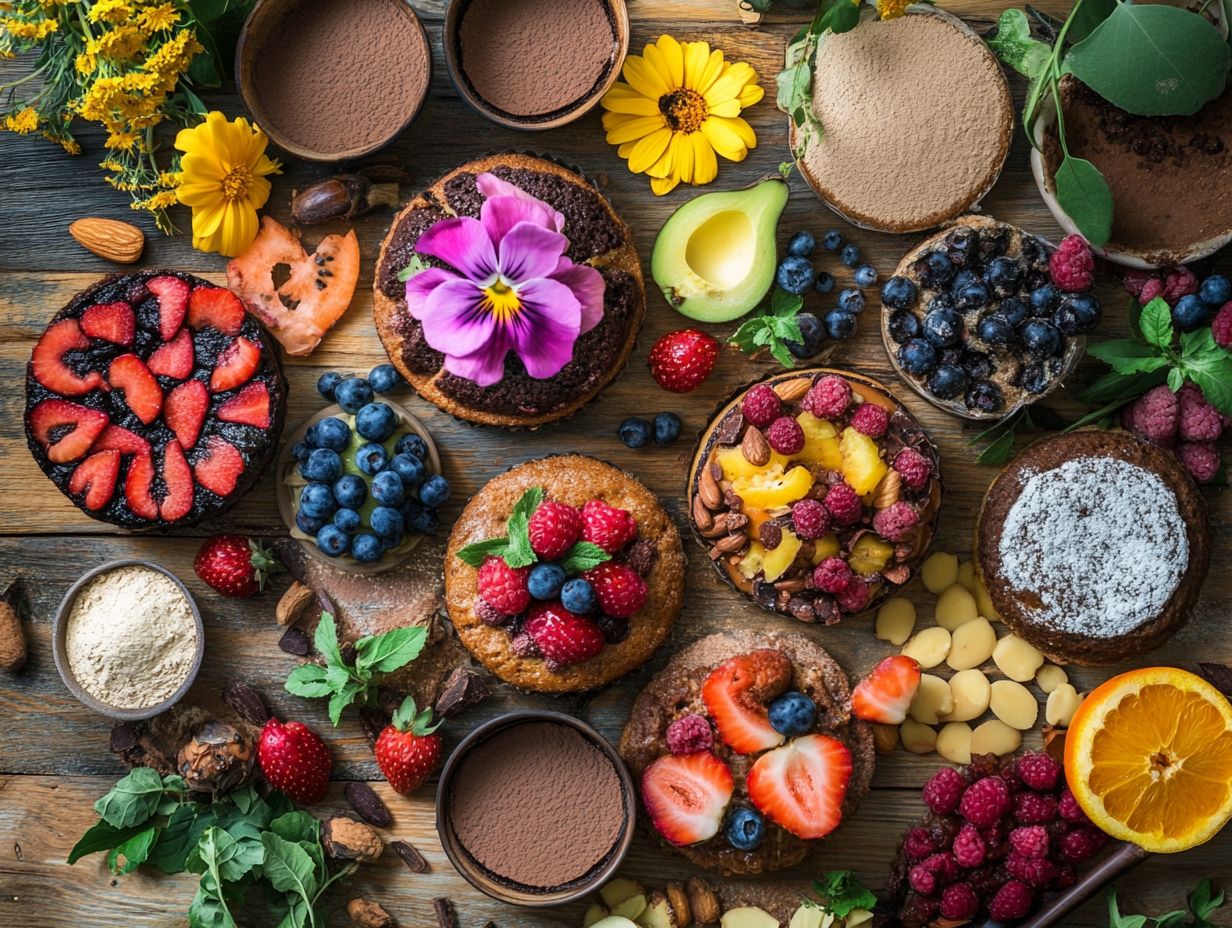
What must-have ingredients will elevate your vegan baking game?
Some essential ingredients for making vegan cakes and other vegan desserts include non-dairy milk like soy milk or almond milk, vegan butter or oil, flaxseed or chia seeds, and a leavening agent like baking powder or soda. You can also add apple cider vinegar or lemon juice to enhance the leavening effect.
Ready to try out your new knowledge? Share your baking experiences or your favorite recipes with fellow baking enthusiasts!
Vegan Baking: Substitutes and Tips
Yes, there are several vegan substitutes for eggs in cake recipes and cookie recipes. Fun options include mashed banana, applesauce, or silken tofu. Another great alternative is using flaxseed or chia seeds mixed with water to create a vegan “egg” texture. You can also use aquafaba, the liquid from canned chickpeas, which works well in many baking recipes.
Do I need to use a specific type of flour for vegan cakes and vegan muffins?
There are several types of flour that work well for vegan cakes and vegan muffins. All-purpose flour, whole wheat flour, and almond flour are excellent choices. You can also use gluten-free flour blends for those with dietary restrictions. Additionally, consider adding oat flour for a lighter texture.
What are some tips for making fluffy and moist vegan cakes and vegan cheesecake?
- Make fluffy and moist vegan cakes and cheesecake by measuring ingredients accurately.
- Avoid over-mixing and use a leavening agent like baking powder.
- Add a splash of apple cider vinegar or lemon juice to activate the leavening agent.
- For extra moisture, incorporate vegan buttermilk, which is made by mixing non-dairy milk with vinegar.
Can I use any type of non-dairy milk in vegan cake recipes and other baking recipes?
While most non-dairy milk options will work in vegan cake recipes and other baking recipes, some may alter the flavor or texture. Soy milk and coconut milk tend to work best, as they have a higher protein and fat content, respectively. These qualities help create a moist and rich cake. Almond milk and oat milk are also great options, depending on your flavor preferences.
Are there any tips for decorating vegan cakes and other vegan desserts?
Yes, you can use vegan frosting options such as coconut cream or vegan buttercream to decorate your vegan cakes. Fresh fruit, vegan chocolate chips, or nuts also make fantastic toppings for added flavor and texture. Be sure to check the ingredient labels to ensure they are vegan-friendly. Brands like Daiya and Nature s Charm offer excellent dairy-free alternatives.
